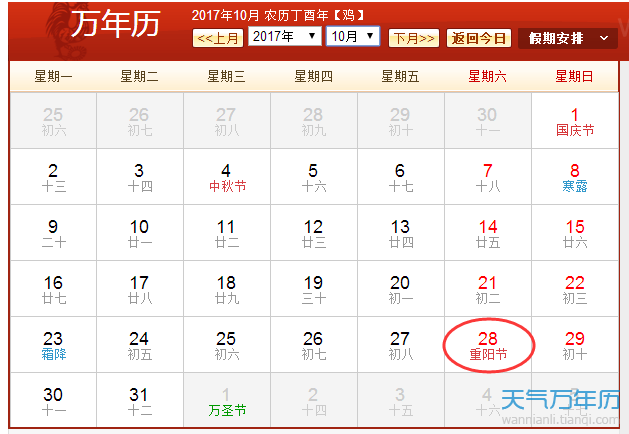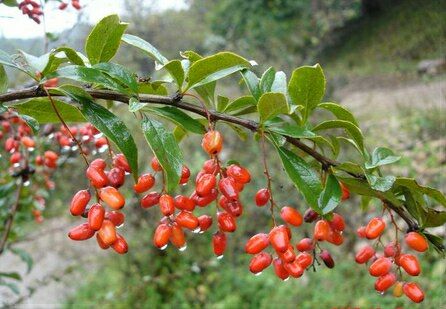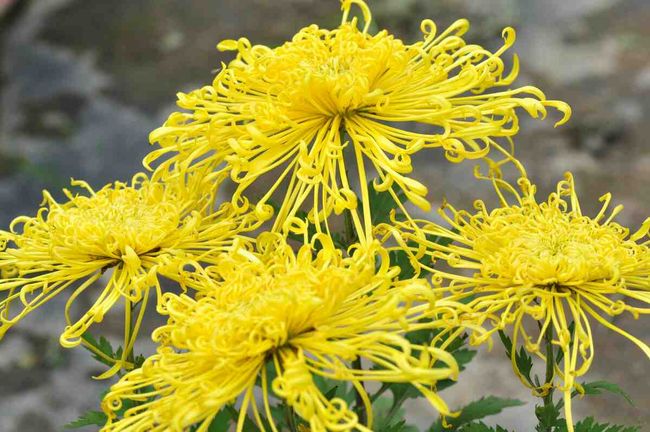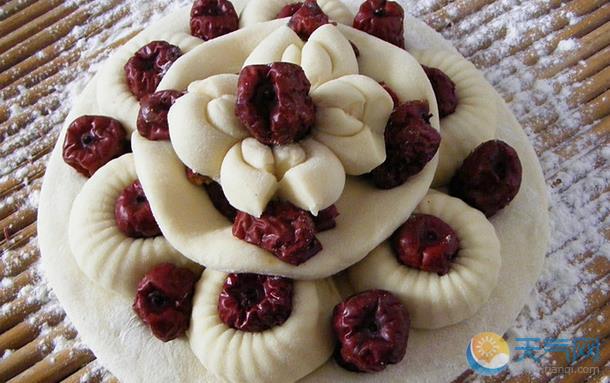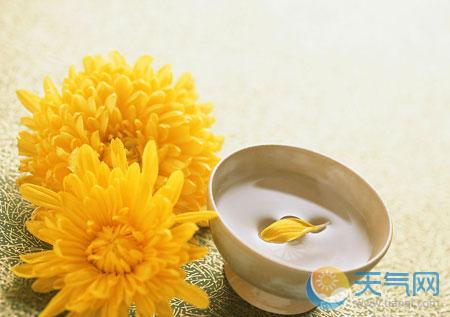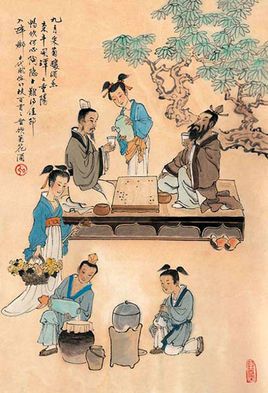今又重阳:江涵秋影雁初飞,与客携壶上翠微《China Daily 10-28 17:28》
今年的10月28日阴历九月初九是中国传统的重阳节。
(英译)The 9th day of the 9th lunar month is the traditional Chongyang Festival, or Double Ninth Festival, which falls on Oct 28 this year.
古书《易经》中把“六”定为阴数,把“九”定为阳数,九月九日,日与月皆逢九,两九相重,故而叫重阳,也叫重九,重阳节翻译成英文即“Double Ninth Festival”。
“重”在中文里意思是“两,又”。同时九又与“久”同音,九九即“久久”,寓意长寿永久,古人认为这天是个值得庆贺的喜庆日子,所以很久之前就开始庆祝重阳节。
(英译)In an ancient and mysterious bookYi Jing, or The Book of Changes, number "6" was thought to be a Yin character, meaning feminine or negative, while number "9" was thought to be Yang, meaning masculine or positive. Therefore, the number nine in both month and day create the Double Ninth Festival, or Chongyang Festival.
Chong in Chinese means "double." Also, as double ninth was pronounced the same as the word to signify "forever", both are "Jiu Jiu," Chinese ancestors considered it an auspicious day worth celebration. That’s why ancient Chinese began to celebrate this festival long ago.
重阳节有哪些习俗呢?下面是关于重阳节你可能不知道的六件事。
(英译)Here are 6 things you may not know about Double Ninth Festival.
1.插茱萸
Wearing cornel twigs (Dogwood)
茱萸是一种常绿乔木,气味浓郁,果实可食用,枝叶可入药。茱萸可以除虫,祛湿,助消化,解内热。春天开花,秋后结果,成熟的果实呈紫褐色,味酸而柔和。
The cornel (dogwood) is a species of evergreen arbor, which is a heavy-scented plant whose fruit is edible and stock and leaves can be medicinal materials. They can expel insects, get rid of the humidity, help digestion and cure inner heat. It puts out purple flowers in spring and bears in autumn, purplish-brown fruit that is sour and mild in nature.
插茱萸的习俗早在唐代就已经盛行,唐朝皇帝颁布法令使重阳节成为官方节日。古人认为古人认为在重阳节这一天插茱萸可以避难消灾,他们或佩带于臂,或插在头上,或作香袋把茱萸放在里面佩带。古时插茱萸的多为妇女和儿童,有些地方的男子也佩戴茱萸。宋朝时,人们将彩缎剪成茱萸和菊花的形状来佩戴。
The custom of wearing cornel twigs (dogwoods) was already very popular in the Tang Dynasty (618-907); an imperial edict made it an official day off for common people. Ancient people believed that planting cornel twigs on Double Ninth Festival could prevent diseases and avoid disasters. They also wore the cornel twigs on their arms or heads or put them in sachets. Most people that follow the custom are women and children, and in some places men also wear them. During the Song Dynasty, people sent each other colorful silk cut into cornel twigs or chrysanthemum and wore them.
2. 赏菊Enjoying chrysanthemum flowers
菊花又称黄花,菊科植物品种繁多。作为多年生草本植物的菊花花期很长,但通常在阴历九月开始开花,为重阳节又增添了几分姿色。因此九月又被称为“菊月”。
Also known as "yellow flower", chrysanthemum is of varied species in the composite family. Though its florescence lasts long, this perennial herb usually begins to bloom in the 9th lunar month, lending a festive flavor to the Double Ninth Day. That’s why the month is also referred to as "the month of chrysanthemum".
因为是晚秋唯一一种盛开的花,菊花历朝历代以来都为诗人们所喜爱。据传晋朝大诗人陶渊明在隐居期间曾种了很多品种的菊花,花期正盛时吸引了众多亲朋好友前来观赏。唐朝的农民起义领袖黄巢写了很多咏菊的诗歌,后被编成菊花集,至今仍被人们传颂引用。唐朝大诗人杜甫也有逾十首歌颂菊花的诗歌。
The flower was favored by poets through the ages, because it is one of the only flowers that bloom in late autumn. It is said that Tao Yuanming, a famous poet of the Jin Dynasty, grew many species of chrysanthemum while he lived as hermit, and the flower, when in full bloom, drew many of Tao’s relatives and friends. Huang Chao, leader of the peasant uprising in the Tang Dynasty, wrote many poems about chrysanthemum, which were compiled into an anthology of chrysanthemum and are often quoted even now. Du Fu, a great Tang Dynasty poet, wrote more than ten poems singing the praises of the flower.
很久以前人们就在重阳节赏菊。农历九月的菊花被誉为“长寿之花”。佩戴菊花的习惯始于唐代,此后这一习俗一直长盛不衰。清朝时一些地方的菊花展一般在节后第二天。北京重阳节的习俗是把菊花枝叶贴在门窗上,“解除凶秽,以招吉祥”,这是头上簪菊的变俗。
Chinese folks were fond of enjoying chrysanthemum on the Double Ninth Day long before. Chrysanthemum blossoms in the ninth lunar month have the beautiful name of "flower of longevity". The custom of wearing chrysanthemum appeared in the Tang Dynasty and was very popular throughout the time afterwards. Chrysanthemum displays were usually held immediately after the day in some regions of China in the Qing Dynasty. People in Beijing began to stick chrysanthemums on doors and windows to "get rid of the bad luck and bring in the good ones", which is an alteration of the custom of wearing chrysanthemum on people’s heads.
3.吃重阳糕Eating Double Ninthcake
重阳糕也称“菊糕”或“花糕”。它可以追溯到周朝(公元前11世纪——公元前256年)。据说,这批蛋糕是在秋收后为农民准备的,正好让人们尝尝当季地收获,后来逐渐成为重阳节时吃的糕点。
重阳糕的“Chong”意味着“两,并”,“Yang”意味着九和“羊”,而“Gao”意味着“糕点”。同时,由于“糕”与“高”同音,重阳节吃重阳糕意味着以后可以步步高升。
Double Ninth cake is also known as "chrysanthemum cake" or "flower cake". It dates back to the Zhou Dynasty (the 11th century – 256 BC). It is said that the cake was originally prepared after autumn harvests for farmers to have a taste of what was just in season, and it gradually became the cake for people to eat on the Double Ninth Day.
The cake was called Chong Yang Gao in Chinese, which means Double Ninth cake as "Chong" means double, "Yang" dichotomously suggests nine and sheep, and "Gao" means cake. Also, because "Gao" (cake) shares the pronunciation with "Gao" (high, tall), people hope to get a higher position in life by having Gao on the Double Ninth Day.
4.饮菊花酒Drink Chrysanthemum flower wine
重阳节最初是农民庆祝收成的日子。重阳节最先成型与战国(475-221 BC),汉朝(206 BC-220 AC)时开始逐渐流行。据说那时吕后嫉妒汉高祖刘邦(汉朝的第一个皇帝,前256或247至前195年)的爱妃戚夫人,刘邦驾崩后,戚夫人被吕后谋害,身边的一个侍女也被驱逐出宫,嫁与平民为妻。侍女贾氏告诉人们,在皇宫里每年阴历九月初九日每人都要佩戴茱萸、饮菊花酒以祈求长寿和避灾。人们听说后纷纷效仿,于是这种习俗在民间就广为流传了。
It was originally a day for farmers to celebrate crop harvests. The festival was created in the Warring States period (475-221 BC) and became popular in the Han Dynasty (206 BC-220 AC). At that time, Queen Lv was so jealous of Concubine Qi, who was one of the favorites of Liu Bang (the first emperor of the Han Dynasty, 256 or 247-195 BC), that she ill-treated the latter and drove her maid out of the imperial palace to marry a common person after the emperor’s death.This maid, who is known as Miss Jia, told people that in the imperial palace every ninth day of the ninth lunar month they wear small cornel twigs (dogwoods) in their hair and drink chrysanthemum wine, otherwise there would be disasters. Later, many common people followed the custom and it gradually prevailed all over the country.
酿造菊花酒颇具特色。据说古人在阴历九月初九采集新鲜的菊花和叶子,将其和谷物混合制成酒,知道第二年的九月初九才可以饮用。据说此酒可以明目、治头昏、降血压,有减肥轻身、安肠胃之妙,有延年益寿的功效。据说菊花酒还有驱邪抗寒的功效。混合了茱萸的菊花酒有祛痛延年的功效。古人重阳节登高时,喜欢在头上佩茱萸、饮菊花酒。
The chrysanthemum flower wine is unique when brewed. Some say in ancient times people usually picked fresh chrysanthemum flowers and leaves on the 9th of the 9th lunar month and brewed the mixture of them and grains into the wine, which could not be drunk until the same day next year. The wine is said to have wholesome effects on sharpness of the eye, alleviation of headache, drop of hypertension, reduction of weight and removal of stomach trouble, thus contributing to longevity. It is said that drinkers of the chrysanthemum wine would be free from evil and have strong physique against cold weather. The chrysanthemum wine, infused with cornel twigs (dogwood) fruit, has wholesome effects on assuagement of pain and regulation of the flow of vital energy. While climbing mountains on the Double Ninth Day, ancient Chinese liked to wear cornel twigs (dogwood) in their hair and drank the wine.
5.登高Climbing heights
重阳节人们喜欢登高爬山,所有这一天又被称作“登高节”。
农历九月,秋高气爽,天朗气清,正是出游观光的好时节。金秋九月,登高远望,天高云淡,远处重峦叠嶂,莽莽苍苍,宜人的秋色让人心旷神怡。
People like to climb heights (mountains) on this festival, so Double Ninth Festival is also called "Mountain-climbing Festival".
The 9th lunar month, with clear autumn skies and bracing air, is a good time for sightseeing. An outing lover, who stands on a height looking afar this month, will have a panoramic view of a blue sky with pale clouds and dark green mountains, which makes him or her carefree and joyful.
在秋天这个天朗气清的季节里登高望远、欣赏自然美景,确实让让人神清气爽!除了避灾驱害这一层的寓意,爬山登高还意味着“爬到更高的位置”,这是古人看重登高这一习俗的重要原因。另外爬山被人们尤其是老年人重视的原因在于其意味着“登顶长寿”。
It is really refreshing to climb mountains and enjoy the beauty of nature during this bright and clear time in autumn. Apart from expelling bad luck and disasters, climbing mountains also indicates "climbing to a higher position", and it is also an important reason why ancient people pay attention to this custom. Another reason that climbing mountains is valued by people, especially by the elderly, is that it means "climb to a longevous life".
6.阖家团聚Family get-togethers
重阳节也是阖家团聚的日子,全家围坐在一起追思先辈,缅怀其做出的牺牲和经历的苦难。通常家庭出游活动是为了重新认识观赏自然美景,以及重申对家人和密友的关爱。
人们经常聚在一起,观赏菊花、佩戴茱萸。登高爬山和吃特制的重阳糕也是这一天的特色。
The Double Ninth Festival is also a time for family get-togethers. It is an occasion to remember one’s ancestors, the sacrifices they made and the hardships they underwent. Often, family outings are organized where people search to renew their appreciation of nature and to reaffirm their love and concern for family members and close friends.
People often gather for parties, enjoy chrysanthemums and pin cornel twigs on clothes. The customs of climbing mountains and eating a special cake is also featured this day.
